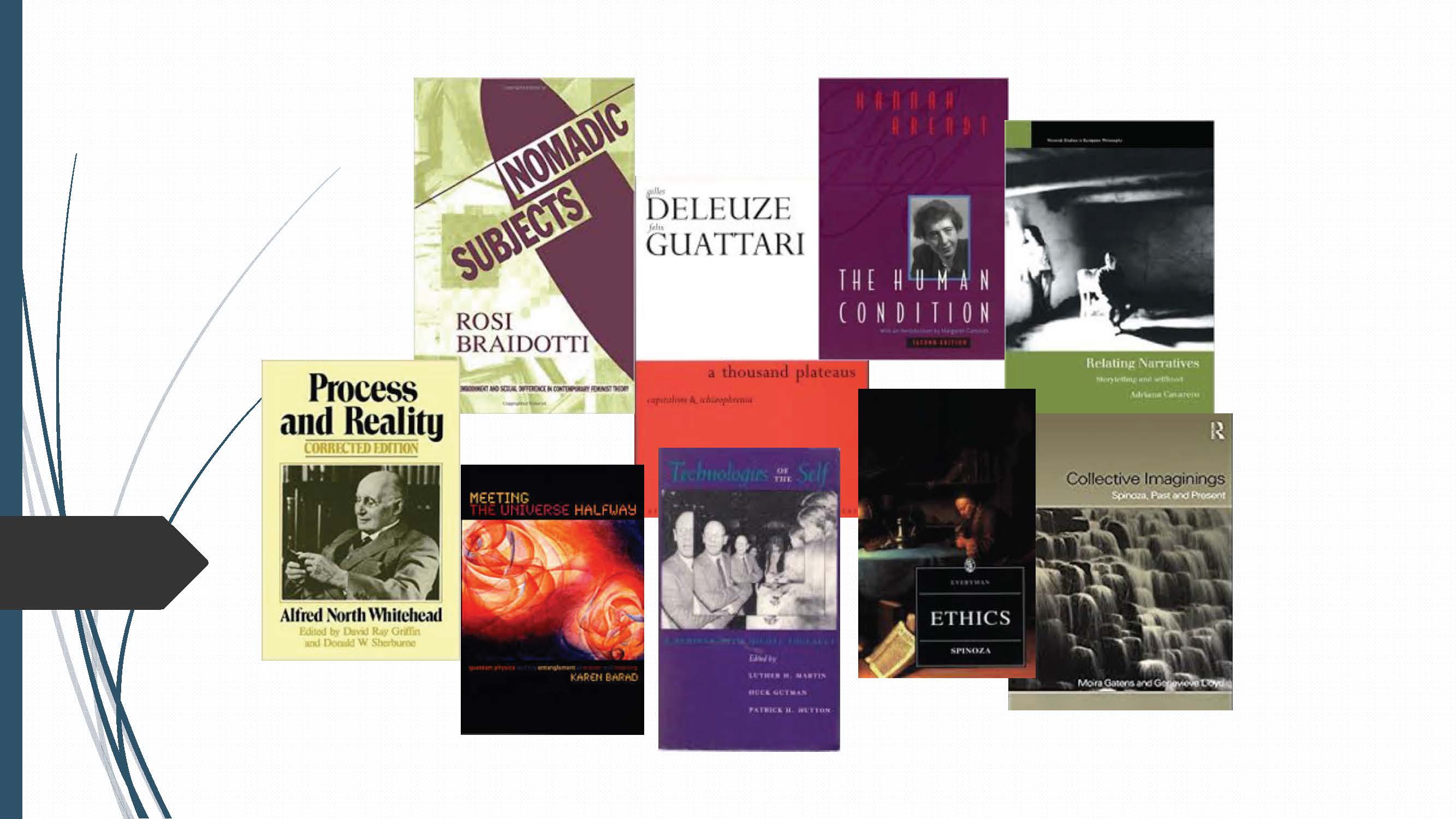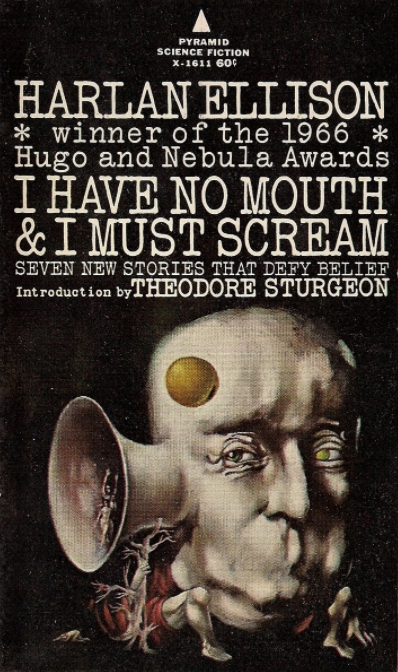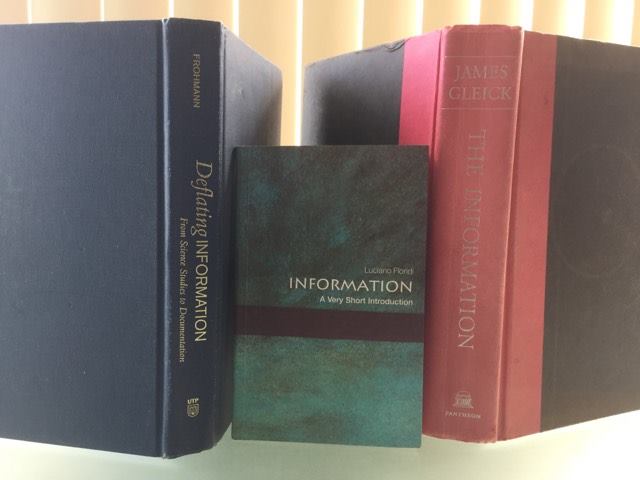Entries
A continually evolving space for members of the COST Action to share reading materials and experiences.
…………………………………………………………
Maria Tamboukou
University of East London, UK
(WG 1)
On the joys and pleasures of reading

It all started with Foucault’s ‘Technologies of the self’. I remember reading the paper, reflecting on the idea that the self is not a substance but a form and thinking about the technologies and practices that had shaped me as a subject. I was finishing my MA at the time and all of a sudden I decided that what I really wanted to do was a PhD on technologies of the self. While working for this PhD one year later I went for my Sunday walk to Camden and my ritual visit to Compendium, the best philosophy bookshop ever, that closed down as soon as Camden lost its hippy ambience at the dawn of the new millennium. But it was still 1993 and as I was browsing the Compendium’s selves I drew out Braidotti’s book, Nomadic Subjects: it inspired my understanding of what ‘the materiality of ideas means’ and opened the doors to the forces of desire and Deleuze and Guattari’s Capitalism and Schizophrenia. Most importantly it taught me the importance of feminist interventions in the folding and unfolding of philosophical ideas and practices.
My engagement with the concept of nomadism, which became central in my project of writing feminist genealogies and which I have recently started to interrogate in the light of the huge refugee crisis, increasingly shifted my attention to ‘how matter matters’. Barad’s Meeting the Universe Halfway was illuminating in this process and it gave me the theoretical toolbox to deal with material entanglements in analysing women artists’ letters and paintings. Women artists were not always good with words, but they were mastering oils, watercolours, wood, metal and clay amongst other art materials they were working with, while shaping and indeed etching themselves as artists in the aesthetic regimes of modernity. It was while working in the interface of matter and narrative that the notion of process became central in my analytics and this is how I was led to Alfred North Whitehead’s Process and Reality. Process philosophy helped me solve many riddles in the narrative/matter encounter, particularly as his thought was so influential in Arendt’s approach to the Human Condition, a book that concentrates my philosophical approach to narratives and my understanding of their role in the shaping of feminist politics via Cavarero’s Relational Narratives.
What has finally underpinned my overall project of writing feminist genealogies is Spinoza’s Ethics as a positive affirmation of politics, particularly as it has unfolded in feminist renditions of his ethics of joy as a moving force in Lloyd’s and Gaten’s Collective Imaginings and beyond, an area wherein I am still reading, re-reading, thinking and writing.
References
Arendt, Hannah. 1998. The Human Condition. Chicago: University of Chicago Press. (Original work published in 1958)
Barad, Karen. 2007. Meeting the Universe Halfway: quantum physics and the entanglement of matter and meaning. Durham and London: Duke University Press.
Braidotti, Rosi. 1994. Nomadic Subjects Embodiment and Sexual Difference in Contemporary Feminist Theory. New York: Columbia University Press.
Cavarero, Adriana. 2000. Relating Narratives: Storytelling and Selfhood. Translated from the Italian by Paul A. Kottman. London: Routledge. (Original work published in 1997)
Deleuze, Gilles and Guattari, Felix. 1988. A Thousand Plateaus: Capitalism and Schizophrenia. Translated from the French by Brian Massumi. London: The Athlone Press. (Original work published in 1980).
Foucault, Michel. 1988. Technologies of the Self. In: Luther, H. Martin, Huck, Gutman, Patrick, H. Hutton, Eds. Technologies of the Self. London: Tavistock, 16-49.
Gatens, Moira and Lloyd Genevieve. 1999. Collective Imaginings: Spinoza Past and Present. London: Routledge.
Spinoza, Baruch. 2002. Ethics. Translated by Andrew Boyle. London: Everyman. (Original work published in 1677).
Whitehead, Alfred, North. 1985. Process and Reality [Corrected Edition]. Edited by David Ray Griffin and Donald W. Sheburne. New York: The Free Press. (Original work published in 1929).
Link to Maria's Almanac entry on Almanac!
…………………………………………………………
Stanimir Panayotov
Central European University, Gender Studies Department
(WG1)

Guattari, Felix. Molecular Revolution: Psychiatry and Politics, translated by Rosemary Shield. Harmondsworth: Penguin, 1984.
Style. Proto-molecule. Forensics gone awry. Stutter, tatter, tat, tit, for, tat, what for… De-stratify, de-institutionalize, de-whatever, de-frost insanity. Code-writing, code-whirling, code-explosion. Cold code, cold cell of insanity. – The stream of consciousness is (of) a structure. Redundancy is neither fated, nor fatal. De-provincialize thy mind. De-sector the looney bin. Years later I read: “Take a chance, deny control and see what happens” (Genesis P-Orridge). Molecular revolution is the irreducible myse-en-abyme of any future materialism. Synthesis is its altar, disjunction is its G-d.

Braidotti, Rosi. Transpositions. On Nomadic Ethics. London: Polity Press, 2006.
I ordered and read this book a month before I became entirely, profoundly unhinged. I lost my body by losing my mind, and I always knew this is going to happen, but I was not afraid to intellectualize this in advance. I later understood the hard part will be how to intellectualize the past experience of aphanisis. No correlation implied, yet years after I realized I had not learned much of the experience, notwithstanding how I dealt with personal trauma and stigmatization, I went back to the book and the answers were entirely different: I was never a nomad of thought, but the rampant thought of nomadism. Yet this was not a mindless nomadism, but a nomadism without (the) political. Hence the cogitarian drama of schizophrenic materiality deprived of any sense whatsoever. Nomadism without politics is like a subject without pathology. The spectre of dormant, inert-maddening materiality in nomadism: without it, nothing is lost – because there is no structure of losing yourself.

Fuss, Diana. Essentially Speaking: Feminism, Nature and Difference. London and New York: Routledge, 1989.
Fuss’ now classic work has early on opened up a nuanced discussion on the essentialism/constructivism divide, yet this happened in a period where the iconoclastic phase of social constructionism had to undergo its own stage of self-fulfillment. This reference is a testimony to the existing archive of feminist scholarship and references that reasonably offered a healthy skepticism to the radicalizing wave of feminist social constructionism. It is a book that serves as a reminder that feminist theory has its own share in a self-styled politics of redemption.

Ellison, Harlan. “I Have No Mouth, and I Must Scream.” IF: Worlds of Science Fiction, Vol 17, No 3, Issue 112, March 1967, edited by Frederick Pohl. New York: Galaxy Publishing Corp, 24-29.
This is a short story, one of the early specimens of post-apocalyptic sci-fi and genre writing from 1967. It is a nearly impersonal narrative taking place a century after the end of humanity. The author tries to re-present the newly abysmal world by way of abbreviated AI species. However, because Ellison tries to describe a depopulated environ, he reaches towards the use of something called “AM” whose meaning constantly shifts. This representational mobility captures the foregoing redundancy of both the situation described and the means of description (in light characters or even pseudo-characters that can pass as “life”). It is an early and prelapsarian attempt to capture something which in NM goes by a more conceptual terming (such as “non-human” or “non-human interface”). A similar narrative can be found also in Charles Stross’ Saturn’s Children. This is a story against the idea that satisfaction and meaningfulness are for-something.
Link to Stanimir's Almanac entries on Diagram, Realism, and (co-written with Helen Palmer) Transversality.
…………………………………………………………
Marc Kosciejew
Department of Library, Information, and Archive Sciences at the University of Malta
(WG1)

Frohmann, Bernd. 2004. Deflating Information: From Science Studies to Documentation. Toronto: University of Toronto Press.
The publication of Bernd Frohmann’s Deflating Information: From Science Studies to Documentation, a significant theoretical contribution to Library and Information Science (LIS) generally and documentation studies specifically, coincided with the commencement of my doctoral studies in the fall of 2004. I was introduced to this book in the early weeks of that first semester when Professor Frohmann delivered an illuminating guest lecture on its theoretical implications for the LIS discipline. The presentation sparked, what was to become, my scholarly passion for documentation studies.
This book’s arguments, perspectives, and examples greatly informed and inspired many of my ideas and scholarly directions. I continually consulted and returned to this book to help construct, expand, and enrich the conceptual scaffolding of my work. It therefore became central to my PhD research and dissertation, in addition to my other academic publications and presentations; in fact, it presently remains a vital resource for my current scholarship and pedagogy.
The book’s main contention is that documentation – that is, documents and practices with them (documentary practices) – has constitutive effects. Frohmann deflates the privileging of information as seemingly more important than documents, arguing instead that “information…exists only as an effect of the ontologically primary elements: documents and documentary practices. It has, therefore, only a secondary or derived ontological status; it is an effect of the relative stability of documentary practices. Once practices stabilize, information can emerge”. Documentation, in other words, helps to constitute and materialize the otherwise abstract concept of information. He states that, in order to better understand documentation, its important roles, and its constitutive effects, it is necessary to “investigate how documents are produced, the uses to which they are put, their zones of circulation, and the effects produced by practices with them”.
I was privileged to have Professor Frohmann serve as my academic advisor throughout my doctoral career. His stewardship and supervision were indispensable in and for my scholarship. I am grateful for his attention to and interest in my scholarly development. This book reminds me of his own commitment to my academic development and success.
Gleick, James. (2011). The Information: A History, A Theory, A Flood. New York: Pantheon Books.
James Gleick’s The Information: A History, A Theory, A Flood was published one year after the successful completion of my doctorate in Library and Information Science (LIS). Although I was aware of its publication, particularly because of many strong scholarly reviews on it, I did not immediately or intentionally set out to acquire it. I came across it by chance when, on a summer afternoon, I was casually browsing a bookstore’s shelves with my mother and nieces. As soon as I saw the book, I picked it up and would not relinquish it.
This book’s main contention is that information is the blood, the fuel, and the vital principle of our world and existence. Its main focus is on the historical developments, and contemporary understandings and uses of, the diverse concepts and practices of information. It explores some of the major historical developments of different kinds of information communication technologies (ICTs), including writing and written alphabets, to talking drums and the Morse Code, to analogue and electric telegraphs, to computers. It further examines some of the most important theoretical contributions to and for information theory, such as concepts presented by Charles Babbage, Ada Lovelace, and Claude Shannon.
This book is an essential resource for everyone interested in (the historical reasons for) how and why we find ourselves now in this so-called information age/economy/society. The book presently is a staple for parts of my pedagogy. I employ it in many curricula for historical and theoretical lectures. In fact, on this very day (a sunny late-winter day in the Mediterranean) of composing this autobibliographic entry, I delivered an informative and exciting lecture to undergraduate students focussing on Gleick’s second chapter about talking drums.
Floridi, Luciano. 2010. Information: A Very Short Introduction. Oxford University Press.
Luciano Floridi’s Information: A Very Short Introduction entered my life when I began lecturing in Europe and designing a new curriculum for a course on information theory. I discovered it whilst conducting my own research on, at the time, the latest theoretical developments in Library and Information Science (LIS). This little green book, like an emerald gem, has become mandatory reading in this required foundational course for both first year undergraduate and diploma students. It is a book that has contributed numerous conceptual explorations and academic directions to many lively class conversations.
Floridi’s stated goal “is to provide an outline of what information is, of its manifold nature, of the roles that it plays in several scientific contexts, and of the social and ethical issues raised by its growing importance”. It is not meant to be exhaustive in its approach and focus, but, instead, it serves as a selective introduction to the field and study of information. The book, for example, introduces different kinds of information, such as mathematical, semantic, physical, biological, and economic, in addition to topics like the information revolution, the language of information, and the ethics of information. Floridi’s stated hope is that it will help its readers “make sense of the large variety of information phenomena with which we deal on a daily basis, of their profound and fundamental importance, and hence of the information society in which we live.”
This book is indeed a vital resource for my teaching. It is also a crucial academic resource for the learning development of my students insofar as (an introduction to) information theory is concerned. It helps provide them with a solid basis on which to build and expand their understanding of and knowledge on this important aspect of LIS and, of course, the wider information environment in which we all live, work, and exist.
Link to Marc's Almanac entries on Documents/Documentation and Information.
COST Action IS1307 New Materialism: Networking European Scholarship on 'How Matter Comes to Matter'.
Here you will find background material, current activities, calls for papers, working group information, and project outputs.
With the changing of societies on local, national and international scales owing to economic, ecological, political and technological developments and crises, a reorganized academic landscape can be observed to be emerging. Scholarship strives to become increasingly interdisciplinary in order to grasp and examine the unfolding complexity of ongoing ecological, socio-cultural and politico-economic changes. Additionally, academics forge... Read more or find out Who's Who
- Call for Papers - Technology Matters and Matters of Technology: Exploring Theories of "Materiality" for Technology Research - June 25, 2018
- The return of materialism(s)? Matter between science, theory and art - University of Iceland
- Call for Entries - New Materialism Almanac 2018
- Urban Matters: Material Engagements with Communities and Borders in Times of Movement
Information relating to activities undertaken, including conferences, training schools, short-term scientific missions, and annual meetings, are archived here.
Filter activities by:
Conference7
Other7
STSM7
Training School7
- 7th Annual Conference: Performing Situated Knowledges: Space, Time, Vulnerability
- From Cosmos to Genes: New Materialist Methodologies Crossing the Humanities, Natural, and Technosciences
- MC Meetings: Barcelona, Maribor and Warsaw
- Training School 2: Research Genealogies and Material Practices
Working Groups focus on four key areas of research
Working Group One
Genealogies of New Materialisms; examines and intervenes in canonization processes by compiling a web-based bibliography, coordinating the OST 068/13 8 EN... Read more
Working Group Two
New Materialisms on the Crossroads of the Natural and Human Sciences; seeks to develop new materialisms at the boundaries of the human and natural sciences. The group focuses on how European new materialisms can rework the ‘Two Cultures' gap... Read more
Working Group Three
New Materialisms Embracing the Creative Arts; brings together European researchers, artists, museum professionals, and other activists with a keen interest in the material... Read more
Working Group Four
New Materialisms Tackling Economical and Identity – Political Crises and Organizational Experiments... Read more
2016–18
The Almanac comprises contributions from members of working groups, and participants in related activities, delineating key terms, more esoteric neologisms, and short provocations. Read more
New Materialism —
Networking European Scholarship on 'How matter comes to matter’

Website by Second Cousins

